|
Core Evaluation Question III
What is the impact of the LSC professional development on teacher preparedness, attitudes, and beliefs about science and mathematics teaching and learning?
In this second year of core evaluation data collection, information about teachers' preparation, attitudes, and beliefs about science and mathematics education came primarily from teacher questionnaires, and to a lesser extent, from principal questionnaires. Cohort 1 projects augmented these data with teacher interviews.
For the newly-funded Cohort 2 projects, these spring 1996 data represent a baseline for gauging the impact of the LSC professional development in future years. Cohort 2 includes both projects that target elementary science (C2S) and projects that target elementary mathematics (C2M).1 Because questions asked about science and mathematics teaching were often different, these two groups are separated for analysis.2
Although this was the second round of data collection for Cohort 1 projects, it is too early to look for impacts of the LSC professional development within individual projects, since in a number of projects only a small proportion of teachers had participated at the time they completed the questionnaires.
This section describes the attitudes reported by teachers in each of the three groups-Cohort 1 science, Cohort 2 science, and Cohort 2 mathematics-without attempting to attribute any differences between Cohort 1 and Cohort 2 teachers to the LSC project. In a later section, we investigate the impact of professional development on both teacher attitudes and classroom practice by comparing untreated teachers in both cohorts to those that had received varying amounts of science/mathematics professional development during the previous year.
Teacher Attitudes and Beliefs about Science and Mathematics Education
A composite created from a number of questionnaire items provides insight into teachers' attitudes about teaching science and mathematics. This composite includes teacher ratings of the importance of various reform-oriented strategies for effective science/mathematics instruction, including:
- Providing students with concrete experience before abstract treatment;
- Developing conceptual understanding;
- Considering students' prior conceptions;
- Making connections with applications/ other disciplines;
- Using computers, hands-on, cooperative groups, and other investigative activities; and
- Using a variety of assessment strategies.3
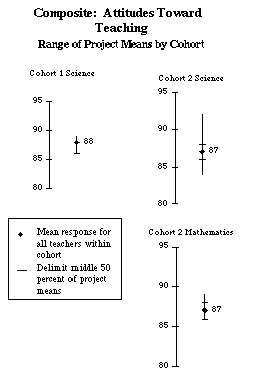
Figure 23
Mean responses to this composite show that most LSC teachers have remarkably positive attitudes toward science and mathematics reform. There is little variation among projects, with means ranging from a low of 84 percent to a high of 92 percent. (See Figure 23.)
In many areas, teachers report attitudes and beliefs that are closely aligned with standards-based instruction. Nearly all teachers surveyed believe that it is at least somewhat important to take students' prior understanding into account when planning instruction and to develop students' conceptual understanding of science/mathematics. Similarly, nearly all the teachers targeted by LSC projects feel that it is important to provide students with concrete experiences before presenting abstractions and to make connections between disciplines. These generally positive attitudes are also reflected by the fact that the vast majority of LSC teachers in LSC districts indicate that they enjoy teaching science and, especially, mathematics. (See Figure 24.)
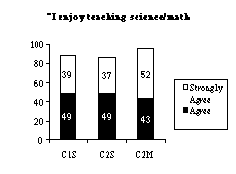
Figure 24
While responses on specific questionnaire items about attitudes and beliefs are generally quite similar across cohorts and disciplines, there are some contrasts of interest. As can be seen in Table 8, mathematics teachers are somewhat less inclined than science teachers to believe that cooperative learning groups and engaging students in inquiry-oriented activities are very important. At the same time, mathematics teachers are more likely than science teachers to rate as very important using prior student understanding in planning curriculum and instruction and developing student conceptual understanding.
Table 8
Teachers Indicating Each Strategy is
"Very Important" for Effective Instruction
|
Percent of Teachers |
|
Cohort 1 Science |
Cohort 2 Science |
Cohort 2 Mathematics |
| Have students participate in hands-on activities | 86 | 87 | 80 |
| Provide concrete experience before abstract concepts | 82 | 80 | 84 |
| Develop students' conceptual understanding of science/mathematics | 75 | 71 | 84 |
| Take students' prior understanding into account | 72 | 71 | 82 |
| Engage students in inquiry-oriented activities | 71 | 71 | 62 |
| Make connections with other disciplines | 70 | 68 | 66 |
| Have students work in cooperative learning groups | 55 | 60 | 46 |
| Use computers | 39 | 44 | 54 |
|
|
It is interesting to note that while nearly all LSC teachers indicate that using cooperative learning groups is at least somewhat important in the elementary science/mathematics classroom, not all see the importance of mixing students of varying abilities. Roughly one in five teachers indicated support for homogeneous grouping in science, and about one in two in mathematics. (See Figure 25.) As one evaluator noted, science teachers seem more open to mixing students of varying abilities:
"Students learn science/mathematics best with students of similar abilities"
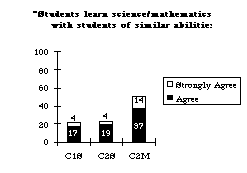
Figure 25
"Most teachers of science support heterogeneous grouping which suggests science instruction is more inclusive and able to address a range of student abilities within the same instructional setting."
LSC Project Evaluator, Cohort 2
LSC teachers are not universally sold on the importance of using student portfolios, informal questioning, and performance-based approaches to assessing student understanding. For example, while about 90 percent of LSC teachers view portfolio assessment as at least somewhat important, only about one-quarter judge it very important. (See Figure 26.) Similarly, nearly all LSC teachers report that informal questioning is an at least somewhat important method of assessing student understanding, but only about half of the teachers feel it is essential.
Importance of Various Alternative Assessment Techniques Percentage of Teachers Responding "Very Important"
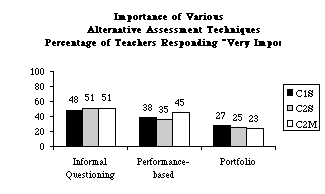
Figure 26
The high scores on Composite 2 and the generally positive attitudes toward science and mathematics education reforms exhibited by teachers throughout LSC leave relatively little room for showing the impact of LSC professional development. As one LSC evaluator noted:
"There is almost overwhelming agreement about the 'importance' of the kind of teaching strategies which the LSC projects emphasize. 'Quick and dirty' conclusion: for this group, the beliefs are in place. These teachers have at least heard what they are 'supposed to' believe, and they can fill in the right answers."
LSC Project Evaluator, Cohort 2
Teacher Perceptions of Their Preparedness
When interpreting teacher responses about their preparedness to teach standards-based science/ mathematics, it is important to keep in mind that their perception of what "prepared" means is apt to change as teachers participate in LSC professional development. Prior to LSC treatment, teachers may tend to "overrate" themselves, as described by these evaluators:
"Teachers believe they are more prepared than they actually are. When they come to the professional development institute, teachers know the vocabulary and the 'politically correct' attitudes of modern science education, but they only have superficial understanding and little ability to apply knowledge."
LSC Project Evaluator, Cohort 2
"A teacher who currently teaches science with a textbook and has sufficient materials to support the activities in the book may report that she is every well prepared to teach physical science'; she is indistinguishable from the teacher who is about to embark on the journey of teaching inquiry-centered materials-based science."
LSC Project Evaluator, Cohort 2
As the following evaluator points out, teachers might likely rate their preparedness lower as they begin to understand the complexities of truly effective standards-based instruction:
"To understand the responses to the question of preparedness, we need to know what the teachers mean by prepared, and 'to teach.' It is not irrelevant in this context to point out that when teachers in [this district] were asked to rate their teaching some time ago, the teachers with the most training who were the most effective classroom teachers rated themselves the lowest. Interpreting the question of preparedness is partially a question of understanding and perception."
LSC Project Evaluator, Cohort 1
With this caveat, self-report data on teacher preparedness yield interesting insights into where teachers think they are and where they currently perceive a need for additional training and support.
The LSC Teacher Questionnaire asked teachers to rate their level of preparation in a number of areas. Regarding their general preparedness to teach science, about one-quarter of science teachers indicate they feel very well prepared, and slightly over 70 percent at least fairly well prepared. (See Figure 27.) Larger percentages of teachers are confident of their preparedness to teach mathematics, with 57 percent of mathematics teachers characterizing themselves as highly prepared and 94 percent at least fairly well prepared.
Level of Preparedness to Teach Science/Mathematics
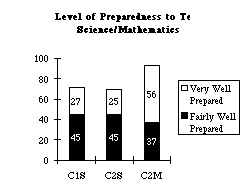
Figure 27
"I am Well-Informed About National Standards in Science/Mathematics"
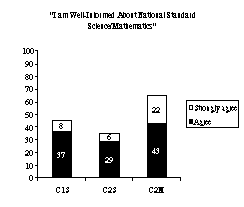
Figure 28
Interestingly, many teachers do not consider themselves well-informed about national standards. This is especially true of science teachers, perhaps reflecting the relative newness of the NRC National Science Education Standards. As can be seen in Figure 28, only 35 percent of Cohort 2 science teachers and 45 percent of the Cohort 1 science teachers report that they are well informed about the standards. In contrast to science teachers, most mathematics teachers report being well-informed about the NCTM Standards. Even prior to participating in LSC professional development, 65 percent of Cohort 2 mathematics teachers indicate they are familiar with the NCTM Standards for the grades they teach.
Several composites were created to examine in detail LSC teachers' perceptions of their preparedness to teach science/mathematics. Each composite focuses on a different area of teacher preparation: knowledge of science/mathematics topics, pedagogical content, instructional strategies, and equity and diversity.
Content Preparation
A composite of items was created to examine teachers' perceptions of their knowledge of various science/mathematics content areas. This composite includes teacher ratings of their preparation to teach the following content:
- Science: human body, ecology, rocks and soil, astronomy, processes of change over time (e.g., evolution), mixtures and solutions, electricity, sound, forces and motion, machines, engineering and design principles (e.g., structures, models).
- Mathematics: numeration and number theory, measurement, geometry and spatial sense, patterns and relationships, and data analysis and probability.
In science, ratings on this composite are lower and show somewhat greater variation than most other composites; project means range from 52 to 65 percent of total possible points. These ratings demonstrate that science content preparation is an area where many elementary teachers perceive themselves as lacking and LSC project activities could have a good deal of impact. The means for mathematics are higher, and show less variation, ranging from 73 to 80 percent. (See Figure 29.)
Table 9 provides results for individual topic areas. In general, these teachers feel more prepared to teach life science topics than earth or physical science topics. While only a handful of LSC teachers report being inadequately prepared to teach ecology or about the human body, one-third feel unprepared to teach electricity. About half of the elementary science teachers targeted by LSC projects indicate they are not adequately prepared to teach engineering and design principles to their students and another third say they are only "somewhat prepared"; these findings are not unexpected given that engineering principles are not a typical focus in elementary science curricula or teacher preparation programs.
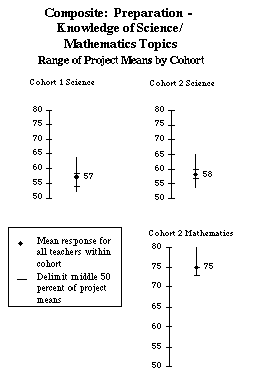
Figure 29
Table 9
Level of Preparedness Reported by
Teachers in Various Science Content Areas
|
Percent of Teachers |
|
Cohort 1 |
Cohort 2 |
|
Not Ad-
equately Prepared |
Some-
what Prepared |
Fairly Well Prepared |
Very Well Prepared |
Not Ad-
equately Prepared |
Some-
what Prepared |
Fairly Well Prepared |
Very Well Prepared |
| Ecology |
5 |
27 |
43 |
24 |
8 |
27 |
40 |
25 |
| The human body |
6 |
23 |
43 |
28 |
7 |
23 |
42 |
28 |
| Rocks and soils |
17 |
33 |
34 |
16 |
15 |
36 |
33 |
16 |
| Sound |
21 |
34 |
31 |
15 |
19 |
36 |
30 |
15 |
| Astronomy |
27 |
36 |
26 |
11 |
22 |
34 |
29 |
14 |
| Forces and motion |
27 |
38 |
27 |
8 |
24 |
37 |
27 |
11 |
| Mixtures and solutions |
28 |
36 |
25 |
12 |
25 |
35 |
28 |
12 |
| Machines |
29 |
38 |
25 |
8 |
27 |
34 |
27 |
12 |
| Processes of change over time |
31 |
34 |
24 |
10 |
28 |
36 |
26 |
10 |
| Electricity |
33 |
34 |
22 |
11 |
29 |
35 |
24 |
12 |
| Engineering and design principles |
49 |
33 |
13 |
4 |
51 |
29 |
15 |
5 |
Baseline data for C2M teachers reveal that they perceive themselves as generally well prepared to teach most of the mathematics topics included in the survey. (See Table 10.) For example, 72 percent of these elementary teachers feel very well prepared to teach computation, and more than 50 percent consider themselves very well prepared to teach patterns and relationships; numeration and number theory; measurement; and estimation. Far fewer teachers report feeling very well prepared to teach such topics as data analysis and probability or pre-algebra/algebra at the elementary level.
Table 10
Level of Preparedness Reported by Cohort 2
Mathematics Teachers in Various Mathematics Content Areas
|
Percent of Teachers |
|
Not Adequately Prepared |
Somewhat Prepared |
Fairly Well Prepared |
Very Well Prepared |
| Computation | 0 | 2 | 26 | 72 |
| Patterns and relationships | 1 | 8 | 36 | 55 |
| Numeration and number theory | 1 | 9 | 35 | 55 |
| Estimation | 1 | 9 | 38 | 53 |
| Measurement | 1 | 9 | 38 | 53 |
| Geometry and spatial sense | 2 | 16 | 41 | 40 |
| Data analysis and probability | 7 | 27 | 40 | 27 |
| Technology in support of mathematics | 11 | 32 | 37 | 20 |
| Pre-algebra/algebra | 17 | 25 | 32 | 26 |
Responses on the principal questionnaire indicate that principals recognize and are concerned about the issue of teacher preparation in science and mathematics content. About three-quarters of principals at LSC-targeted schools indicate that teacher preparation to teach science subject matter is a problem. (See Figure 30.) Nearly 30 percent of these principals characterize it as a major problem at their school. Teacher preparation in mathematics content is not seen as problematic by as many principals, but it is a serious issue at a number of schools (a "major problem" according to 19 percent of Cohort 2 mathematics principals). These data indicate that most principals at elementary schools targeted by LSC projects are aware of their faculty's lack of content background in science and mathematics and the impact this has on classroom instruction. Principals' recognition of this issue may be a first step toward administrative support for LSC staff development initiatives.
Principal Concerns: Effect of Teacher Preparation on Science/Mathematics Instruction
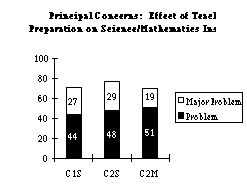
Figure 30
Based on early indications from Cohort 1 teachers, it seems likely that LSC professional development will have a significant impact on teacher preparation in science and mathematics content and pedagogy, and in their self-confidence in these areas. The following evaluator comments are typical:
"Science has been an area of interest for this teacher. She always felt that students must be actively involved in it. The difference is that this year she knows more about how to present science to her first grade students and to stress concept development. She is more confident about her teaching style and her content knowledge."
"When interviewed in spring 1996, teachers report they are learning science concepts and processes themselves through project PD opportunities and through teaching the [LSC project's] curriculum modules to students in their classes. They mention how much their confidence and interest in teaching science is changing, and say the [LSC project's] training has played a critical role in that change."
LSC Project Evaluator, Cohort 1
Preparation in Pedagogy, Instructional Strategies, and Assessment Techniques
Teachers were asked several questions regarding their preparedness to implement a number of pedagogical and instructional strategies central to standards-based science and mathematics instruction. The pedagogical content composite combines teacher ratings of their preparation to:
- Provide concrete experience before abstract treatment;
- Develop students' conceptual understanding;
- Take students' prior conceptions into account; and
- Make connections with other disciplines.
The instructional strategies composite provides a snapshot of teachers' preparedness to implement instructional strategies including:
- Hands-on activities;
- Cooperative learning groups
- Using computers in the science/mathematics classroom; and
- Having students take responsibility for their own learning.
Ratings on these composites indicate that elementary teachers tend to be more comfortable with standards-based pedagogy and instructional strategies in mathematics than in science. (See Figures 31 and 32.).
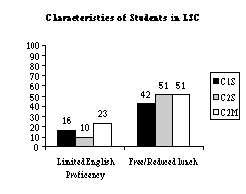
Figure 31
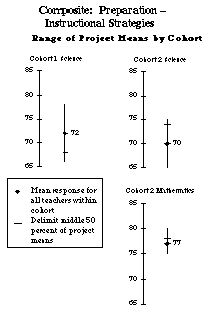
Figure 32
Many teachers characterize themselves as fairly well (but not very well) prepared to implement standards-based pedagogical techniques. For example, while roughly 75 percent of teachers consider themselves at least fairly well prepared to take students' prior understanding into account when planning curriculum and instruction in science, only 30 percent consider themselves very well prepared to do so. Very similar responses are seen for other pedagogical strategies such as developing students' conceptual understanding, making connections between disciplines, and providing concrete experiences before abstract concepts. (See Table 11.)
Table 11
Teacher Perceptions of Their Preparation
to Implement Standards-Based Instruction
|
Percent of Teachers |
|
Cohort 1 Science |
Cohort 2 Science |
Cohort 2 Mathematics |
|
Fairly Well Prepared |
Very Well Prepared |
Fairly Well Prepared |
Very Well Prepared |
Fairly Well Prepared |
Very Well Prepared |
| Provide concrete experience before abstract concepts | 47 | 20 | 46 | 18 | 46 | 41 |
| Develop students conceptual understanding of science | 48 | 17 | 49 | 17 | 50 | 37 |
| Take students' prior understanding into account | 49 | 26 | 45 | 29 | 42 | 46 |
| Make connections between disciplines | 47 | 24 | 46 | 23 | 47 | 32 |
| Have students work in cooperative learning groups | 46 | 37 | 42 | 39 | 38 | 43 |
| Have students participate in hands-on activities | 42 | 30 | 37 | 27 | 36 | 52 |
| Engage students in inquiry oriented activities | 43 | 21 | 42 | 19 | 47 | 24 |
| Use computers | 27 | 9 | 27 | 13 | 35 | 19 |
Similarly, many teachers consider themselves fairly well (again, not very well) prepared to use standards-based instructional strategies. For example, 71 percent of Cohort 2 mathematics teachers say they are at least fairly well prepared to engage students in inquiry-oriented activities; only 21 percent said they are very well prepared to do so. Somewhat higher levels of preparedness are reported for strategies like using cooperative learning groups and hands-on activities in the classroom. The lowest levels of preparedness are reported for using computers in science/mathematics instruction; only 36 percent of teachers in C1S, 40 percent in C2S, and 54 percent in C2M say they are at least fairly well prepared in this area.
Comparing the importance teachers place on these pedagogical strategies to the level of preparedness they feel reveals an interesting contrast. (See Figure 33.) Across the board, teachers report higher levels of import than personal preparedness to implement standards-based strategies. For example, over 80 percent of LSC targeted teachers feel that providing students with concrete experience before presenting abstract concepts is very important in science/mathematics instruction; however, fewer than 20 percent of science teachers, and only 41 percent of mathematics teachers feel highly prepared to practice this in the classroom. Over two-thirds of the LSC teachers feel it is very important to make connections between science/ mathematics and other disciplines, but only about one-quarter feel they are well prepared to do it. These data indicate that teachers have positive feelings about the importance of various components of standards-based instruction, but they are somewhat less assured of their preparedness to implement them in their own classrooms.
Pedagogical Strategies
Comparison of Teachers Responding "Very Important" and "Very Well Prepared" to Use Various Strategies
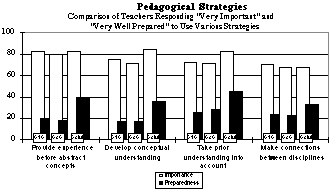
Figure 33
Questionnaire results show a very similar disparity between teacher ratings of the importance of other standards-based instructional strategies (such as hands-on activities, cooperative learning, and using computers) and their perceived level of preparedness to use these strategies with students. (See Figure 34.) For example, engaging students in inquiry-oriented activities is considered very important by 71 percent of science teachers and 62 percent of mathematics teachers; yet only about 20 percent of the science teachers and a quarter of the mathematics teachers feel well prepared to use inquiry methods. As one evaluator noted:
"They are comfortable with their ability to take into account students' understanding when planning instruction and having students participate in hands-on activities. It is good to see that they recognize that hands-on instruction is not necessarily minds-on instruction as they are less comfortable in their ability to engage students in inquiry-oriented activities."
LSC Project Evaluator, Cohort 1
Instructional Strategies
Comparison of Teachers Responding "Very Important" and "Very Well Prepared" to Use Various Strategies
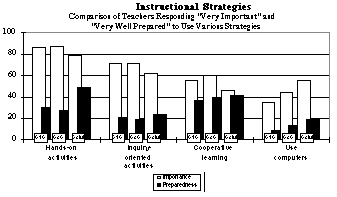
Figure 34
Even though fewer than half of LSC teachers view computer use as highly important for elementary science/mathematics instruction, this is still a great contrast to the fewer than 15 percent who feel highly prepared to use computers in the classroom. Again, such contrasts between the perceived importance and the preparedness teachers report might be indicators of areas where LSC teachers would be especially interested or motivated to receive assistance.
As mentioned earlier, LSC teachers do not all agree on the importance of authentic assessment techniques advocated by the national standards. Still, as with pedagogy and instructional strategies, there is frequently a marked contrast between the importance teachers place on a particular assessment strategy and the level of preparedness they report for using it. (See Figure 35.) For example, about half of the LSC teachers think that informal questioning is an important way of gauging student understanding; yet, only about 30 percent of the teachers feel very well prepared to use this assessment strategy. Similarly, performance-based assessment is viewed as very important by more teachers than feel prepared to assess children in this manner. Interestingly, the only strategy surveyed that does not demonstrate this trend (higher levels of importance than teacher preparedness) is portfolio assessment; more mathematics teachers consider themselves very well prepared to use portfolios to assess student understanding (30 percent) than report it as a very important assessment technique (22 percent). Among science teachers, the general trend is seen again, as about one-quarter of the teachers consider portfolios very important and only about 15 percent feel highly prepared to use them for assessing student progress.
Instructional Strategies
Comparison of Teachers Responding "Very Important" and "Very Well Prepared" to Use Various Strategies
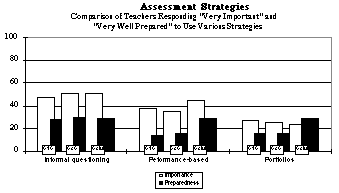
Figure 35
Preparation to Address Issues of Equity in the Classroom
Teachers were asked questions regarding their preparedness to deal with issues of equity and diversity in the classroom. This attitudinal composite includes teacher ratings of their preparedness to:
- Recognize and respond to student diversity;
- Use strategies that specifically encourage participation of females and minorities;
- Involve parents in the science/mathematics education of their children;
- Take student prior conceptions into account; and
- Use cooperative learning groups.
Ratings on this composite show that teachers generally feel fairly well prepared to deal with equity issues. (See Figure 36.) For example, nearly all teachers report feeling at least somewhat prepared to recognize and respond to student diversity and to encourage student interest in science/mathematics and nearly half of the teachers characterize themselves as very well prepared in these areas.
Somewhat fewer teachers are as confident of their ability to use strategies that specifically encourage the participation of females and minorities in science/mathematics. Only about 35 percent of science teachers and 42 percent of mathematics teachers report that they are highly prepared to be proactive in this regard.
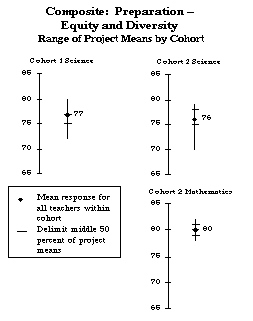
Figure 36
Level of preparedness to involve parents
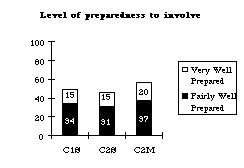
Figure 37
Much lower percentages of teachers responded that they are prepared to involve parents in the science/ mathematics education of their children. Approximately 15 percent of science teachers and 20 percent of mathematics teachers report they are very well prepared in this area. (See Figure 37.)
At the same time, teachers are reporting that inquiry-based instruction is helping get parents involved. Noted two LSC teachers:
"Children are talking about what they did at school during the day. The kids drag their mothers in to see what happened."
LSC Elementary Teacher, Cohort 1
"Parents, when in the classroom, can't believe we have this stuff in the room. They come in often, visit, help with the teaching."
LSC Elementary Teacher, Cohort 1
A Cohort 1 evaluator reported the following comment from a parent of a student whose teacher has participated in LSC professional development:
"We became excited with [our son] as he would come home all excited about the stages of the Monarch caterpillar. We were informed about his progress often. I feel he is a lot more aware of certain things around him now-trees, changing leaves, sunshine versus darkness. He just has an enthusiasm for science in general and I hope he gets to experience more of this in the classroom in the future."
Parent, Cohort 1
Summary
Elementary teachers targeted by LSC projects have remarkably positive attitudes toward science and mathematics reform. Teachers place high levels of importance on many standards-aligned pedagogical and instructional strategies such as providing concrete experience before abstractions, developing students' conceptual understanding, making connections between disciplines, and using inquiry-oriented activities. Attitudes about alternative assessment strategies are not so closely aligned with standards-based instruction; many LSC teachers do not place a high level of importance on techniques such as performance-based and portfolio assessments.
The generally positive teacher attitudes contrast markedly with the level of preparation teachers report for the same strategies. Teachers targeted for LSC professional development generally do not consider themselves well-prepared to implement many elements of standards-based instruction. Disparity between the perceived importance and the preparedness teachers report might be indicators of areas where LSC teachers would be especially interested or motivated to receive training.
In addition, many LSC teachers report feeling a lack in their preparation to teach a number of the science and mathematics content areas they are expected to teach, suggesting a need for increased attention to content in professional development.
- Four Cohort 2 projects target both science and mathematics. For analysis, teachers from these projects who completed the science questionnaire are included in C2S; teachers who completed the mathematics questionnaire are included in C2M.
- Note that all teachers in both Cohorts 1 and 2 are elementary teachers, and are typically responsible for teaching multiple subjects. For the purposes of this report, teachers who completed the science version of the LSC Teacher Questionnaire are referred to as "science teachers" and those who completed the mathematics version are referred to as "mathematics teachers."
- The questionnaire items included in this composite differ somewhat for science and mathematics, so it is not possible to compare science and mathematics results.
| 
